29/12/19 The Holy Family
“Sunday Scripture Reflections” (Fr. Frank Doyle SJ)
 Tranditionally on the Sunday after Christmas we celebrate the feast of the Holy Family.
Tranditionally on the Sunday after Christmas we celebrate the feast of the Holy Family.
In some respects, it was very modern in being just a one-child family. And we may be inclined to think that, with three such good people, life must have been very easy for them. But, if we are to take the Incarnation seriously, there is no reason to believe that this family – living the lifestyle of a rural village in those times – did not have its share of hardships over the years.
In addition there is the record of the child being lost for three days in a large and strange city. Imagine the anxiety of the parents in such a situation. Later the mother will see her son become famous and then the object of great hostility. She will see him abused, arrested, tried, sentenced, scourged, crowned with thorns and finally die like a common criminal with two criminals before jeering crowds. Few mothers have to go through that kind of experience.
Today, in celebrating the Holy Family, we ask God’s blessings on our own families. It is a cliche to say that family life today is in trouble. And it is a self-perpetuating problem.
Children from dysfunctional families themselves set up equally dysfunctional families. Never having experienced good family life, how can they themselves establish a good family? And it seems that very few couples go through any real formation process in being husband and wife and parents. Yet the skills needed do not come naturally – or easily.
Jesus said that where two or three are gathered in his name, he is there among them. This should be true of every Christian family. The Catholic family is the basic Christian community, through which Christ is present and reveals himself in this world. It has been called the domestic church.
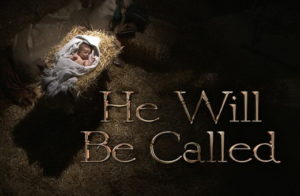 Christian families not only belong to the Church, their lifestyle is a living out of the Christian vision: the vision of unconditional love in a truly sharing community.
Christian families not only belong to the Church, their lifestyle is a living out of the Christian vision: the vision of unconditional love in a truly sharing community.
Family life is not meant to be lived in isolation. The world around it is not just there for its benefit. It should be united with, supporting and supported by the other families in the parish community and with the wider Church.
The mission of the family is identical to that of the whole Church: to give tangible witness to the vision of Christ for the world.
 Jewish weddings involved three stages. First, there was the engagement. This was often prearranged by the parents or a matchmaker while the couple were still young children. Marriages were primarily seen as the union of families and the continuing of the family line. They were not primarily unions of love, as we expect today. Of course, in the course of time husband and wife could become deeply bonded by a genuine love and caring for each other. But it was procreation, especially the bearing of sons, that was the first priority. So we see in Old Testament times how cursed women felt who could not bear sons for their husband and his family.
Jewish weddings involved three stages. First, there was the engagement. This was often prearranged by the parents or a matchmaker while the couple were still young children. Marriages were primarily seen as the union of families and the continuing of the family line. They were not primarily unions of love, as we expect today. Of course, in the course of time husband and wife could become deeply bonded by a genuine love and caring for each other. But it was procreation, especially the bearing of sons, that was the first priority. So we see in Old Testament times how cursed women felt who could not bear sons for their husband and his family.
Love might or might not come later; it was secondary. And it was only relatively recently that the Catholic Church itself put the two ends of marriage – love and procreation – as equally important. It took quite a while in the Church for the idea that a deep Christian love could be expressed through sexual intercourse, that it involved a deep mutual giving of one’s whole self to the spouse and that it was not just a regrettable but unavoidable means to procreate.
Later came the betrothal. This was a legally binding relationship lasting for one year. During this period the couple lived apart and had no sexual relations. If either party did not want at this stage to go through with the marriage, there had to be a divorce. And the penalty for having sexual relations with a betrothed virgin was stoning to death for both. The third stage was the marriage itself.
We can see then Joseph’s serious dilemma, not to mention his feeling of shock, when he found that his betrothed was already pregnant and not by him. It seemed an open and shut case of adultery.
And imagine the feelings of Mary herself in this position! How was she to explain that she was pregnant by the power of God? Who would believe a story like that? If Joseph felt outraged and betrayed, one would understand. Most men would have planned vengeance at such an insult to their manliness and the possibility of becoming the laughing stock of the other men in the village.
But Joseph was not an ordinary person. He was a “righteous” man. And he must have seen in Mary more than an ordinary person too. He did not want to expose her openly. To do so would have made her liable to the severest punishment. But at the very least the Mosaic law required a man to divorce his wife under such circumstances. This was Joseph’s duty and he was going to observe it.
But compassion for his bride (extraordinary in the circumstances and in that culture) led him to want to break off the engagement quietly that is, before a minimum of two witnesses and without pressing charges.
Just then the angel appears to him telling him to go through with the marriage. The child has been conceived by the power of God’s Spirit. No other man is involved. The son is to be called ‘Jesus’, which means ‘Saviour’ because his mission is to save his people from their estrangement with God.
As a descendant of David, Joseph will become the legal father of Jesus the Messiah. And Jesus will be called later in the Gospel, “Son of David”. As Paul puts it in the Second Reading today: he, Paul, is preaching the gospel “concerning [God’s] Son, who was descended from David according to the flesh and was declared to be Son of God with power according to the spirit of holiness by resurrection from the dead, Jesus Christ our Lord”.
In many ways, Joseph is a reflection of Joseph in the Hebrew Testament, the son of Jacob who was sold into slavery by his jealous brothers. He was also a righteous man, influenced by dreams and forced into exile in Egypt.
Eleven times altogether in his gospel Matthew indicates how events in the life of Jesus are fulfilments of Hebrew Testament promises. Here he quotes the prophet Isaiah (using the Greek Septuagint text): “Look, the virgin shall conceive and bear a son.” The child will be called Emmanuel, which Matthew explains as meaning “God with us”. Jesus will be the very presence of God the Father in our world. As John says in his Prologue: “The Word became flesh and pitched his tent among us”. God is with us and is one of us. And this presence does not end with the Resurrection.
 Before Jesus leaves his disciples at the Ascension, his last words (in Matthew’s Gospel) are: “I am with you always – to the very end of time” . Right down to the present, Jesus continues to be Emmanuel. And that is why we continue to celebrate the birth of Jesus 2,000 years on. Through his Body, the Church, the Christian community, Jesus continues to be visibly present in word and action. This Eucharist is our sacramental celebration of that presence, a presence in every single one of us here.
Before Jesus leaves his disciples at the Ascension, his last words (in Matthew’s Gospel) are: “I am with you always – to the very end of time” . Right down to the present, Jesus continues to be Emmanuel. And that is why we continue to celebrate the birth of Jesus 2,000 years on. Through his Body, the Church, the Christian community, Jesus continues to be visibly present in word and action. This Eucharist is our sacramental celebration of that presence, a presence in every single one of us here.
The effectiveness of that presence depends on our conscious union with Jesus and with the vision of his Gospel lived out in our daily lives. Let Jesus be really re-born in each one of us this Christmas.
15/12/19 3rd Sunday of Advent
《Living Space》(Fr. Frank Doyle SJ)
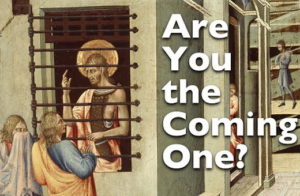 The Mass text and readings today are full of joy, especially the Entrance Song, the Opening Prayer and the First Reading from Isaiah.
The Mass text and readings today are full of joy, especially the Entrance Song, the Opening Prayer and the First Reading from Isaiah.
“Rejoice in the Lord always. Again, I say, rejoice!” is the cry of the Entrance Antiphon. Why? Because “the Lord is near”.
The Opening Prayer asks that we, “who look forward to the birthday of Christ, experience the joy of salvation and celebrate that feast with love and thanksgiving.”
In the First Reading the prophet goes overboard with excitement and enthusiasm:
Let the wilderness and dry lands exult,
let the wasteland rejoice and bloom…
let it rejoice and sing for joy.
And the reason for all this?
They shall see the glory of the Lord, the splendour of our God.
And is it just a matter of being able to see him? No, for
Look! your God is coming… He is coming to save you!
Salvation means bringing healing, wholeness and holiness as we become closely united to him. This healing, wholeness and holiness is depicted graphically:
The eyes of the blind shall be opened, the ears of the deaf unsealed,
then the lame shall leap like a deer
and the tongues of the dumb sing for joy.
These words, as we will see below, will be applied explicitly to Jesus who brought this healing and wholeness into so many people’s lives.
However, we should not confine this healing only to the physical. It will also include healing on the emotional, social and spiritual levels. We are not made whole until harmony and wellbeing flows through our whole self.
All this is closely linked to today’s Gospel. We find ourselves, in Matthew’s Gospel, at the mid-point in Jesus’ ministry. John the Baptist had already been arrested. He had accused King Herod of doing something immoral, namely, marrying his brother’s wife while his brother was still living.
While in prison, John hears about Jesus and sends some of his disciples with a question: “Are you the one who is to come, or are we to wait for another?” Whether John really wanted to know or whether it was really for the benefit of his disciples is not clear. After all, John had already proclaimed Jesus at the River Jordan and said he was not worthy to unloose the thongs of Jesus’ sandals. “The one who is to come” is, of course, the long-expected Messiah.
How does Jesus answer? As so often happens, he does not respond directly to the question but quotes the prophet Isaiah using the passage which is our First Reading for today. “Go back and tell John what you hear and see: the blind see again, and the lame walk and the lepers are cleansed, and the deaf hear, and the dead are raised to life and the Good News/Gospel is preached to the poor.”
This exactly describes what Jesus has been doing. It also exactly conforms to what Isaiah said about the time of the Messiah. Jesus in effect is saying “Yes, I am the one who is to come. I am the Messiah, the Christ, the Saviour King of Israel.”
While the Gospel speaks of the Messiah already here, we at this very time are, in a sense, still waiting in anticipation. Jesus, of course, is already present and working through his Body, the Christian community, the Church. But he still has to come more fully into our own lives. As the Opening Prayer suggests, we need to “experience the joy of salvation” – that power of healing and wholeness which Jesus can bring into our lives. This is something each one of us has to do and what we as a community also have to do. I feel that there are still many, including Christians, who have not yet experienced the deep joy of becoming whole in Christ.
For most of us, the transformation into becoming “another Christ” takes time. We need the advice of James in the Second Reading: “Be patient.” As he says, “How patiently [the farmer] waits for the precious fruit of the ground until it has had the autumn rains and the spring rains!”
John the Baptist is presented by Jesus as one of the greatest persons ever born. Yet he missed the privilege being born into the age of Christ, a privilege that has been made available to us. We could do well to emulate John in preparing ourselves for Jesus to become really part of our lives.
 John was strong. He was a man of integrity. He was not one of the rich and famous. He was no pop star – all sound and no substance. He would never have made a glamorous icon for Hello magazine. Yet many people went out to hear him, to be challenged by him, to have their lives radically changed by his words.
John was strong. He was a man of integrity. He was not one of the rich and famous. He was no pop star – all sound and no substance. He would never have made a glamorous icon for Hello magazine. Yet many people went out to hear him, to be challenged by him, to have their lives radically changed by his words.
Actually, our Christian vocation is similar to his. We are called to prepare the way for Jesus to come into our own hearts but also to prepare other people’s hearts so that they, too, may “experience the joy of salvation”, that healing, wholeness and holiness we all long for and which alone gives real meaning to our lives. Christmas is a time of gifts – both giving and receiving. Let us make sure that among the gifts we offer to others is some of the Christian joy which we ourselves have received.
8/12/19 2nd Sunday of Advent
《Living Space》(Fr. Frank Doyle SJ)
 In today’s Mass in the context of Advent and Christmas. There is a real challenge for us to identify with this programme in word and action. Strange as it may seem, God expects our co-operation in carrying it out.
In today’s Mass in the context of Advent and Christmas. There is a real challenge for us to identify with this programme in word and action. Strange as it may seem, God expects our co-operation in carrying it out.
But now to John the Baptist, a great figure in his own right and a true prophet in the Jewish tradition with a message from God. We know he had a large following of disciples and many people came out to the desert to hear him speak. He performed a ritual in water by which people expressed sorrow for their sinful lives and turned back to God. That ritual was called baptism.
In some ways the role of John was not unlike that of Jesus, yet, in other ways, very different.
Like Jesus, John preached a message of repentance. ‘Repentance’ here, as elsewhere in the New Testament, translates the Greek word metanoia (metanoia). It is much more than just being sorry for the past. It involves a deep and radical change in one’s thinking and behaviour. ‘Radical conversion’ would be a better rendering than ‘repentance’, which somehow implies simply going back to one’s past but without the sin.
Like Jesus, too, John will be rejected, persecuted, ‘handed over’ and finally executed for his courageous defence of truth and justice.
But there are also clear differences between John and Jesus. This was not least in their lifestyles. John lived a severely ascetical life as a hermit in the desert. People came out to him; he did not go to them. Jesus, on the other hand, is seen as a socialiser living mainly in cities and towns. He goes out of his way to mix with all kinds: rich and poor, religious and secular, good and bad. Nor does he hesitate to enjoy the hospitality of their houses. Yet, through it all, Jesus enjoys a high level of personal freedom, at home with all but manipulated by none. Totally in contact with the world but not tainted or influenced by its weaknesses.
John emphasises that Jesus outranks him completely. He is not worthy to untie Jesus’ sandals. He is simply preparing the way for the Messiah, the Christ, the Saviour King. Jesus, on the other hand, is the Way.
John’s baptism was an individual expression of a desire to come back from sin to God, to return to a faithful following of the Law. The baptism of Jesus, on the other hand, comes with the “Holy Spirit and fire”. It inaugurates a special relationship with Jesus, through which the baptised person becomes incorporated into the very Body of Christ, becomes, as it were, a very extension of Christ himself. It involves not just personal reformation but becoming involved in the remaking of the whole world, bringing the whole world into the Reign of God.
Two kinds of people were coming out to see John. There were ordinary people, genuine penitents, looking for reconciliation with God. There were also Pharisees and Sadducees. However, these came out, not to express sorrow for sin, but to test John’s orthodoxy and observance of the Law.
John has little time for them. He sees them just as much in need of repentance and conversion as anyone else. They are not to think that, simply because they are descendants of Abraham, their salvation is assured. It is not birth, race, religious affiliation, education, social status, or financial clout that makes us friends of God but our awareness of our total dependence on him for everything we need. Salvation only comes to those who give themselves totally into God’s hands and make his will their own. No one is saved simply by being born a Law-abiding Jew, as the Pharisees seemed to think, any more than being baptised into the Christian Church alone brings salvation. Much more is expected. Jesus later on will say that those who presume they are God’s people but without the actions to prove it will have to give way to tax collectors and prostitutes, who, because they reformed, will go into the Kingdom first.
Matthew is not just lashing out at some Jewish leaders. The words of John today are primarily directed to ourselves, to the Pharisee and Sadducee in each one of us. Our most dangerous enemy is complacency: “I’m a good enough Catholic. I’m not perfect, of course, I’m not a religious fanatic but I keep the basics of my religion. I’m OK.” Where our relationships with God are concerned, to stay in the same place is to go backwards.
If we have such a casual attitude to the demands of our faith, we may look on Advent and Christmas as merely memories of past historical events. But Advent means “coming” and, if this season is to be meaningful, there has to be a genuine coming of Jesus into our lives both as individuals and as community. It is a time to remind ourselves of our constant need for metanoia.
If John the Baptist were to come among us today, what would he tell us? What would he warn us against? As we come to the end of another calendar year (and the beginning of the Church year) where do we need conversion and change in our lives? How can we and our families give better witness to the Christian message? What changes are called for in the way our parish gives corporate witness to the Gospel? The celebration of Advent calls for a serious consideration of these questions.
 We are probably well into preparations for the celebration of Christmas. But what preparations have I made for the time afterwards, for the year that is ahead? Will Jesus be really part of my life? Will he really be entering my life in a special way at this time? Are his concerns my concerns? Namely, a desire that I be of service to others, that I work with others to build a better society, founded on love and justice and an equitable sharing of resources.
We are probably well into preparations for the celebration of Christmas. But what preparations have I made for the time afterwards, for the year that is ahead? Will Jesus be really part of my life? Will he really be entering my life in a special way at this time? Are his concerns my concerns? Namely, a desire that I be of service to others, that I work with others to build a better society, founded on love and justice and an equitable sharing of resources.
“Peace (and justice) on earth to those who are God’s friends” needs to become not just the song of the angels but a programme for me and my community.
1/12/19 1st Sunday of Advent
“Sunday Scripture Reflections” (Fr. Frank Doyle SJ)
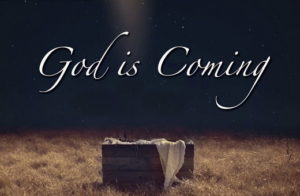 Many of us are like the people mentioned in today’s Gospel: “Before the flood they were eating and drinking, marrying and giving in marriage, until the day Noah entered the ark, and they knew nothing till the flood came and swept them all away…” These people were doing very ordinary things. Exactly the same things that we do. But they were so busy doing them that they failed to give any thought to where their lives were ultimately leading and what was the goal of that life.
Many of us are like the people mentioned in today’s Gospel: “Before the flood they were eating and drinking, marrying and giving in marriage, until the day Noah entered the ark, and they knew nothing till the flood came and swept them all away…” These people were doing very ordinary things. Exactly the same things that we do. But they were so busy doing them that they failed to give any thought to where their lives were ultimately leading and what was the goal of that life.
They were very busy, just like us. Maybe they were very successful, maybe they made a lot of money, maybe they made wonderful marriages, had lots of exciting experiences… But, in the end, they were not ready for the most important appointment of their lives. The question is: how ready am I right now?
Maybe you think: “I don’t have to worry. I had my medical check-up the other day and the doctor said I have the heart of a teenager.” But how many teenagers end up as statistics on the death toll on our roads every year? For them, death is something which happens to other people, to old and sick people.
We sometimes think that the busier we are the better. (We even like to say, “The devil finds work for idle hands to do.”) We work for today, for tomorrow, for next month, for next year, for our future, for our children’s future… But what about our real future? Our future with God? What preparations are we making for that future?
So the Gospel today says, “Of two men in the fields, one is taken, one is left; of two women at the millstone grinding, one is taken, one left.” This could mean that one is taken away by a natural or personal disaster (an earthquake or a heart attack) and the other left untouched. Or it could mean that God takes one away to himself and abandons the other. In either event, the basic meaning is the same. Two men, two women on the outside apparently the same, doing the same work. And yet there is an important difference between them. One is prepared and one is not.
Of course, in our daily lives we have to work, cook food, earn our living, take care of our families… but we must also prepare for the final call. That is the most basic reality of our lives. If we forget that, all our other success is actually failure. Let us remember the story of Martha and Mary. Martha was so busy about good things, about taking care of others but it was Mary who was in the right place, in touch with the centre of meaning, the Word made flesh.
And we do not know when the Lord will come. “If the owner of the house had known in what part of the night the thief was coming, he would have stayed awake and not let his house be broken into…” And, in many ways, it is a blessing that we do not know the day nor the hour. On the one hand, if we did know, we could be filled with a terrible anxiety knowing what the final blow was going to be or, on the other hand, we would let our lives go completely to pot knowing that we could straighten everything out at the last minute. In either case, our world would become a terrible place in which to live. So it is a question of being ready for any eventuality. “Stay awake, for you do not know on what day your Lord is coming…”
The obvious question to ask is, How are we to prepare? St Paul today in the Second Reading has some advice. “Let us give up all the things we tend to do under cover of darkness and live decently as people do in the daytime.” I guess there are dark areas in all of our lives. Things we do, things we say, things we think, the indulging of our lower and self-centred appetites; things which we would not like other people to know about because they are quite wrong. They do no good to me or to others.
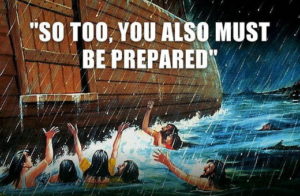 Instead, we need to develop our relations with God and with our brothers and sisters based on a caring and unconditional love for all. We need to learn how to find God, to find Jesus in every person, in every experience. We need to respect every person as the image of God. We are to love our neighbours as ourselves, to love everyone just as Jesus loved us.
Instead, we need to develop our relations with God and with our brothers and sisters based on a caring and unconditional love for all. We need to learn how to find God, to find Jesus in every person, in every experience. We need to respect every person as the image of God. We are to love our neighbours as ourselves, to love everyone just as Jesus loved us.
If, in our words and actions, our daily lives are full of the spirit of Jesus, then we have prepared. We do not need to be anxious about the future or what will happen to us. Concentrate on today, on the present hour, the present situation and respond to it in truth and love and the future will take care of itself. Then we do not have to fear no matter when Jesus makes his final call. Because we know he is going to say: “Come, my friend. I want to call you now; I want to share with you my life that never ends.” And we will respond: “Yes, Lord, I am ready. I have been waiting for you all this time.” It will be an encounter, not of strangers, but of two old friends.
24/11/19 Christ the King
Canon Dr. Daniel Meynen
 For this feast of Christ the King of the Universe, on this last Sunday of the liturgical year, the Church proposes to us a Gospel that is violent, wild, impassioned. The Kingship of Christ has been disputed from its earliest days: shortly after he had appeared in this world, Christ the King was already being rejected and persecuted! After the Magi asked King Herod: “Where is the King of the Jews who has just been born?” , that merciless despot massacred hundreds of little children: the first martyrs of the kingship of Christ!
For this feast of Christ the King of the Universe, on this last Sunday of the liturgical year, the Church proposes to us a Gospel that is violent, wild, impassioned. The Kingship of Christ has been disputed from its earliest days: shortly after he had appeared in this world, Christ the King was already being rejected and persecuted! After the Magi asked King Herod: “Where is the King of the Jews who has just been born?” , that merciless despot massacred hundreds of little children: the first martyrs of the kingship of Christ!
Indeed, one must have much courage to recognize Jesus as King of the Universe… “The people stood by, watching,” says Saint Luke. What crowd was this? Who were these people? Are they not the same people who, five days earlier, had acclaimed Jesus with the cry: “Blessed is the King who comes in the name of the Lord!”? Indeed, they are the very same people… alas… The voices that cry out are the same, but the spirits have changed… How is this possible? Why such a reversal of the situation?
The reason for this is that the Holy Spirit, the Spirit of Love, had not yet come upon them… They had not yet received the power from on high that would allow them one day to testify to the kingship of Christ, even to the spilling of their own blood for love of his kingdom. Soon, on the day of Pentecost, this same crowd, or at least some part of it, will answer the call to conversion given by the Apostles, will repent for its cowardice, and will form the first groups of Christians who, under a single Spirit, will be “of one heart and soul”!
Above the crucified Jesus was an inscription: “This is the King of the Jews.” It is true: Jesus is the King of the Jews, and the first Christians were Jews. This means that, at its beginning, the Church formed, with Christ, not only a spiritual unity, but also a people, a nation, in the true sense of the word. Of course, from the time of the admission of non-Jews to the Church, it is spiritual unity that prevails, and the Kingdom of Christ, which could have been visible and tangible as a people and a nation, is relegated today to the invisible universe of hearts and souls.
Jesus said: “The kingdom of God is in the midst of you.” This is the spiritual aspect of the Kingdom of God, which is much more important than its exterior and corporeal aspect. For, if the Jews, who acclaimed Jesus the King during his triumphal entry into Jerusalem on Palm Sunday, had had the kingdom of God in them, then, without any doubt, with the help of the grace of the Holy Spirit, they would have proclaimed their faith in Jesus the King of the Jews five days later, at the foot of the Cross of Calvary! But the day will come when the Jews will convert and recognize Jesus as their Messiah and their King. Then, with all the Church, they will be able to acclaim Jesus the King of the Jews and the King of the Universe, as if they had been there, at the foot of the Cross of Calvary…
If the Kingdom of God is within us, if God lives in our hearts, there is, however, no doubt that, at the Return of the Lord in Glory, this Kingdom will be revealed to the light of day: it will no longer be hidden, but rather it will brightly shine! But then, it will no longer only be the Kingdom of Love, but also the Kingdom of Justice! When each man and woman, when you and I will appear, face to face, before the King of the Universe, then each one will do justice to the Lord: each one will recognize whether or not he is a faithful subject of this great King.
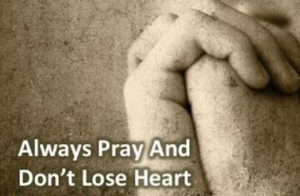 Thus, one of the two criminals nailed to the crosses on either side of Jesus recognized that what he suffered at that moment was just: “We are receiving the due reward of our deeds.” He admitted to having done evil, but the acceptance of his punishment proves that he was repentant and that he hoped from the bottom of his heart to obtain the forgiveness of God… So he addressed himself to Jesus, whom he recognized as King of the Jews, and said to him: “Jesus, remember me when you come into your kingdom!” This “good thief”, known by the name of Saint Dismas, already does justice to the Kingdom of God and, with all his heart, under the influence of the Holy Spirit, calls for the Return of the Lord in Glory!
Thus, one of the two criminals nailed to the crosses on either side of Jesus recognized that what he suffered at that moment was just: “We are receiving the due reward of our deeds.” He admitted to having done evil, but the acceptance of his punishment proves that he was repentant and that he hoped from the bottom of his heart to obtain the forgiveness of God… So he addressed himself to Jesus, whom he recognized as King of the Jews, and said to him: “Jesus, remember me when you come into your kingdom!” This “good thief”, known by the name of Saint Dismas, already does justice to the Kingdom of God and, with all his heart, under the influence of the Holy Spirit, calls for the Return of the Lord in Glory!
“Truly, I say to you, today you will be with me in Paradise.” The words of Jesus are unambiguous: Dismas is with him in Heaven! But, today, we too can hope for a similar reward. If we worthily communicate of the Body of Christ, then, we do justice to the Kingdom of God, we recognize Jesus as King of the Jews and King of the Universe, not only in our heart, but also in our entire person: already, we call for the return of the Lord Jesus!
17/11/19 33rd Sunday in Ordinary Time
Canon Dr. Daniel Meynen
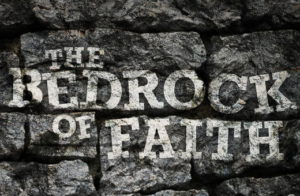 Today, the Church celebrates the thirty-third Sunday of the year. Soon it will be the end of the liturgical year: next Sunday, we will celebrate the feast of Christ the King, and in two weeks, we will begin liturgical year 2008. Now, the liturgical year forms a complete cycle, a time during which the Church relives the entire history of Salvation in Jesus Christ. So, since we are at the end of the present cycle, today’s readings speak to us of the end of human history and of the Return of the Lord at the end of time.
Today, the Church celebrates the thirty-third Sunday of the year. Soon it will be the end of the liturgical year: next Sunday, we will celebrate the feast of Christ the King, and in two weeks, we will begin liturgical year 2008. Now, the liturgical year forms a complete cycle, a time during which the Church relives the entire history of Salvation in Jesus Christ. So, since we are at the end of the present cycle, today’s readings speak to us of the end of human history and of the Return of the Lord at the end of time.
Is it useful and important for us to speak of the end of time? If Jesus himself spoke of it, then there is no doubt that it has some importance. And yet, to speak of the end of time is like speaking about the end of our life, and thus about our death… Do people generally want to speak about such a subject? I do not believe so… For many people, death is something to be dealt with later on, not today… This would be true even if death were to unfailingly bring us Heavenly bliss! For we are all so attached to life!
Many years ago, in a time when the secularization of society was not as advanced as it is today, someone wished a lady of a certain age his best wishes for the new year. After having wished the lady happiness, health, and peace, he concluded by saying: «And Paradise at the end of your days!» But the lady cried out: «Do not speak of misfortune!» This is a true story, alas… But are we not a little like this lady? Do we have a true, strong desire for Heaven? Do we truly like to hear about the end of our life?
This passage should be compared to the following from Saint Matthew: “Then if any one says to you, ‘Lo, here is the Christ!’ or ‘There he is!’ do not believe it. For false Christs and false prophets will arise and show great signs and wonders, so as to lead astray, if possible, even the elect.” Indeed, when the Lord Jesus will return, no one, or almost no one, will be expecting him! For Christ will come like a thief, surprising a great number of people who will not be expecting him. Indeed, Saint Paul recommends to Christians that they live in expectation of the Lord in order that his coming might not surprise them like the coming of a thief: “But you are not in darkness, brethren, for that day to surprise you like a thief. … We are not of the night or of darkness. So then let us not sleep, as others do, but let us keep awake and be sober.”
Moreover, it will not be necessary to go here or there to see the risen Lord. Of course, Christ will be in a certain, specific place at his second coming. But what will be most important then is that he be in us! For, if Jesus is in us through his grace, then we will see him in us, for what we already are – that is, the Body of Christ – will then be manifested to the eyes of everyone. Indeed, Saint John tells us: “Beloved, we are God’s children now; it does not yet appear what we shall be, but we know that when he appears we shall be like him, for we shall see him as he is.” If Jesus is in us, and if we will be able to see him in us when he returns, it is because, during our life, we had been able to communicate worthily of his Body and his Blood in the sacrament of the Eucharist: “He who eats my flesh and drinks my blood has eternal life, and I will raise him up at the last day.”
Today, like yesterday and tomorrow, the Church follows her Lord: each day, the Christian is invited to bear his Cross and follow Jesus on the way that leads to Heaven. The disciple is not greater than the Master! If the Lord Jesus underwent the trial of the Cross, the Church must also undergo this trial. This is why Jesus says: “This will be a time for you to bear testimony.” But it is precisely because the Church follows Christ that the Church is already resurrected with Christ: it is because of this hope through which she is already resurrected that the Church can worthily give testimony of her faith and of her love for the Savior of men!
 The words of the Lord apply to every age and to every persecution that the Church has had to undergo throughout the ages. But as for the final struggle, the final battle, that which we call the “agony”, it truly seems, according to the words of the Lord, that this conflict will take place on the level of ideas and words, and not so much on that of physical violence, even if some people will die. Indeed, Jesus assures us: “But not a hair will not fall from your head.” Thus, the elect of God, those who will have confidence in the Lord and his Holy Spirit, will be engaged in a spiritual and intellectual contest – one could even call it psychological warfare – from which they will emerge victorious thanks to the very Wisdom of God, in which they will then share.
The words of the Lord apply to every age and to every persecution that the Church has had to undergo throughout the ages. But as for the final struggle, the final battle, that which we call the “agony”, it truly seems, according to the words of the Lord, that this conflict will take place on the level of ideas and words, and not so much on that of physical violence, even if some people will die. Indeed, Jesus assures us: “But not a hair will not fall from your head.” Thus, the elect of God, those who will have confidence in the Lord and his Holy Spirit, will be engaged in a spiritual and intellectual contest – one could even call it psychological warfare – from which they will emerge victorious thanks to the very Wisdom of God, in which they will then share.
10/11/19 32nd Sunday in Ordinary Time
Canon Dr. Daniel Meynen
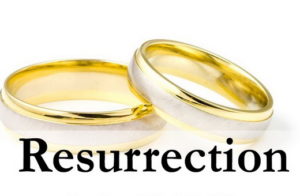 Five days before his Resurrection from the dead, Jesus is questioned by members of the sect of the Sadducees, men who may have been religious but who did not believe in the resurrection of the body. Jesus, the Savior of men, had just resurrected Lazarus a few days earlier, saying on that occasion: “I am the resurrection and the life!” This signifies that the Resurrection was very much on Jesus’ mind: he was already living it! These Sadducees had chosen a very bad time to try to deny the resurrection… Or rather, the Evil One, the Devil, had chosen a very good occasion to try to discourage the Savior by whom he – the enemy of human nature, the angel of darkness and of eternal death – was about to be defeated…
Five days before his Resurrection from the dead, Jesus is questioned by members of the sect of the Sadducees, men who may have been religious but who did not believe in the resurrection of the body. Jesus, the Savior of men, had just resurrected Lazarus a few days earlier, saying on that occasion: “I am the resurrection and the life!” This signifies that the Resurrection was very much on Jesus’ mind: he was already living it! These Sadducees had chosen a very bad time to try to deny the resurrection… Or rather, the Evil One, the Devil, had chosen a very good occasion to try to discourage the Savior by whom he – the enemy of human nature, the angel of darkness and of eternal death – was about to be defeated…
If, during this life on earth, a woman were to marry, in succession, several men who died one after the other, or, reciprocally, if a man were to successively marry several women, it is clear that, if they “are accounted worthy to attain to that age and to the resurrection from the dead”, then they would have particular emotional ties to each other, just as in the case of ordinary couples made up of a single man and a single woman. But, in any case, there is something else that Jesus wants to try to render comprehensible to his contradictors, and to us today as well.
Indeed, if the Resurrection of bodies is important and absolutely essential to the eternal happiness of the men and women that God created in his Love, this Resurrection of bodies does not have for its primary goal the glorification of the person thus resurrected, body and soul, but rather the Glory of Christ himself, the Head of the Church, his Mystical Body. The Resurrection of bodies is destined first and foremost to the glorification of what Saint Augustine calls the “Total Christ”, that is, the union of Christ and the Church.
Thus, all those who will be resurrected, body and soul, for eternal life will be entirely turned towards Christ: all of their being, body and soul, will be for the Glory of Christ, and thus for the Glory of God! This is why Jesus adds: “They cannot die any more, because they are equal to angels and are sons of God, being sons of the resurrection.” No creature will ever be able turn away from God any of the elect who will be in Heaven: neither their own selves, nor their own bodies, nor any other being will be able to turn them away from God! Only one thing is important for the men and women resurrected body and soul: the Body of Christ!
 Jesus quotes God’s words to Moses: “I am the God of your father, the God of Abraham, the God of Isaac, and the God of Jacob.” Jesus quotes these words, not only in order to try to convince the Sadducees, but above all to express his desire for his own Resurrection, which will take place in five days… Jesus is three days away from his Passion and death: thinking of his coming Resurrection is, for him, the greatest of consolations! But saying and proclaiming it also strengthens his confidence in the Omnipotence of his Father, who is in Heaven!
Jesus quotes God’s words to Moses: “I am the God of your father, the God of Abraham, the God of Isaac, and the God of Jacob.” Jesus quotes these words, not only in order to try to convince the Sadducees, but above all to express his desire for his own Resurrection, which will take place in five days… Jesus is three days away from his Passion and death: thinking of his coming Resurrection is, for him, the greatest of consolations! But saying and proclaiming it also strengthens his confidence in the Omnipotence of his Father, who is in Heaven!
We, too, who live today, awaiting our own Resurrection, let us not hesitate to proclaim our faith in eternal Life! Let us live in the desire to see, one day, face to face, the Lord Jesus, he who is the Head of so great a Body, his Church! Let us prepare our own Resurrection, let us proclaim our faith in the risen Jesus, the source of all Life and all Resurrection! Today, let us prepare ourselves to receive the Sacrament of the Body and Blood of Christ, let us ask the Most Holy Virgin Mary to prepare our heart to receive Jesus for the Glory of God, in the perfect unity of the Body of the risen Christ!
 The episode recounted by Saint Luke in this Sunday’s Gospel takes place shortly before the Passion of the Lord. After going to Jericho, Jesus would continue on to Bethany and then to Jerusalem, entering that city in triumph on Palm Sunday. Jesus had a well-established reputation: he was thought to be the great Prophet that everyone awaited, the Messiah! So a multitude of people rushed to Jericho when Jesus went there. There were many people there, so many in fact that those who were of small stature, like Zacchaeus, a publican or tax-collector, could not see this Jesus about whom one heard so much: “He sought to see who Jesus was, but could not, on account of the crowd, because he was small of stature.”
The episode recounted by Saint Luke in this Sunday’s Gospel takes place shortly before the Passion of the Lord. After going to Jericho, Jesus would continue on to Bethany and then to Jerusalem, entering that city in triumph on Palm Sunday. Jesus had a well-established reputation: he was thought to be the great Prophet that everyone awaited, the Messiah! So a multitude of people rushed to Jericho when Jesus went there. There were many people there, so many in fact that those who were of small stature, like Zacchaeus, a publican or tax-collector, could not see this Jesus about whom one heard so much: “He sought to see who Jesus was, but could not, on account of the crowd, because he was small of stature.”
If all this had taken place today, Jesus would have had no trouble being seen by everyone, or almost everyone. Assuming that Jesus would be of interest to as many people today, proportionally speaking, as he was to those of his time – which remains to be proven – then there is no doubt that almost everyone would be able to see him enter Jericho, or, for that matter, Rome, Paris, or London… Indeed, television allows someone to be seen everywhere at once, throughout the entire world! But would each one of us have demonstrated a great desire to see Jesus? How much effort is required to look at that screen, that magic lantern? Without doubt, our effort today would be less great and less meritorious than that of Zacchaeus nearly two thousand years ago…
Religion disturbs us! Faith and morals are demanding! To go to Heaven, one must make an effort! Let us not forget, Jesus is only a few days away from his Passion! The Holy Spirit is upon him and guides him on his way to Jerusalem. But, on the way there, the Spirit of the Lord acts upon the men and women of the towns and villages Jesus goes through, and he, the Spirit, the Power of God, already pours himself out upon these future disciples of Christ: he provokes in them heroic thoughts and deeds. Notably, he inspires Zacchaeus to make an effort to see this Jesus, the great Prophet. So Zacchaeus runs to where the Lord is headed, he precisely determines where he will pass, he climbs up a tree, a sycamore, and he awaits his passage! Truly, Zacchaeus goes out of his way and makes an effort to see Jesus! His effort will be greatly rewarded…
Zacchaeus demonstrated his love for Jesus by making an effort to see him. For his part, Jesus demonstrated his Love for Zacchaeus in particular, and for all men in general, by inviting himself to stay at Zacchaeus’ house. What a marvelous exchange! Love for love! “Jesus said, «If a man loves me, he will keep my word, and my Father will love him, and we will come to him and make our home with him.»” If Christ stays at the home of Zacchaeus on this day, he does so to express, through this sign, his entry into the heart of this same Zacchaeus. For, indeed, it is the coming of the Lord into our soul that is important…
To make an effort to see Jesus… What a goal! It is certainly in Heaven that all of us, if we make an effort, will be able to see Jesus, seated at the right hand of the Father, living in the Holy Spirit. Then, eternally, God the Trinity – Father, Son, and Holy Spirit – will live in us and we in him! But, already, all of this can be realized today. For we can receive the Lord in us through the sacrament of the Eucharist: if we make an effort, day after day, to keep ourselves pure of every sin, then, truly, God remains in us and we in God in holy communion. “He who eats my flesh and drinks my blood abides in me, and I in him.”
 Zacchaeus was a sinner… Who is not a sinner? Who has never been one? Only the Most Blessed Virgin Mary has never sinned. So, when Jesus says: “the Son of man came to seek and to save the lost,” does this mean that Jesus did not come to earth for Mary? Certainly not. Jesus came into the world first for Mary – for she was the first, in time, to benefit from the presence of the Savior – and then for all other men and women. But Mary, included in time, far from rejecting sinners, forms but a single body with them, with us! Mary, conceived without sin, is the Mother of all men: she has, with all sinners, a unique link, one that renders her solidary with everyone!
Zacchaeus was a sinner… Who is not a sinner? Who has never been one? Only the Most Blessed Virgin Mary has never sinned. So, when Jesus says: “the Son of man came to seek and to save the lost,” does this mean that Jesus did not come to earth for Mary? Certainly not. Jesus came into the world first for Mary – for she was the first, in time, to benefit from the presence of the Savior – and then for all other men and women. But Mary, included in time, far from rejecting sinners, forms but a single body with them, with us! Mary, conceived without sin, is the Mother of all men: she has, with all sinners, a unique link, one that renders her solidary with everyone!
We too, today, like yesterday and tomorrow, we are solidary with all sinners. And if my neighbor has sinned, I am, in a certain sense, responsible for his sin. Similarly, if I want Peace to reign in the world, I must first place peace in my heart, in my home, my family, my surroundings, my country! If each one of us makes an effort to see the Lord and to await his passage, then there is no doubt that the Lord, who is the Prince of Peace, will come and dwell among us!
 This is a well-known parable: that of the Pharisee and the publican! Everyone can recognize himself in one of these two characters. But in which? In the Pharisee, or the publican? This is the question we ask ourselves today. If we see ourselves in the publican, then I strongly suspect that we are false publicans and, alas, true Pharisees… For it is not a question of how WE see ourselves, what WE think of ourselves, how WE justify ourselves, but rather of what we are in the eyes of God. It is, in fact, God who justifies man, and not man who justifies himself.
This is a well-known parable: that of the Pharisee and the publican! Everyone can recognize himself in one of these two characters. But in which? In the Pharisee, or the publican? This is the question we ask ourselves today. If we see ourselves in the publican, then I strongly suspect that we are false publicans and, alas, true Pharisees… For it is not a question of how WE see ourselves, what WE think of ourselves, how WE justify ourselves, but rather of what we are in the eyes of God. It is, in fact, God who justifies man, and not man who justifies himself.
To have humility is to be true to oneself: humility is the truth. He who is truly humble will always see pride in himself. True humility does not realize its own state: he who has humility believes himself to have nothing, when in fact he has God, for him and in him! The man who knows himself to be a creature dependent on God humbles himself so much, putting himself in his proper place before his Creator, that God cannot leave him in this state: the Lord lifts him up to his own Glory in order to make him his adopted child. In a word, he who humbles himself, God justifies!
The more someone belittles himself before God, the more the Lord is pleased to come and live in him and to make him shine with his divine light. “God is Light,” Saint John tells us . This is why Saint Paul said that all those in whom God lives, as in his Temple, are “light in the Lord” : they are “children of light”. This is a true paradox, a paradox of the Gospel, of course… One must, in fact, reduce oneself to nothing before God, believe that one owes everything to the Lord, and act on this belief, in order to take part in the greatest work there is in the world: the Work of God!
“You are the light of the world… Let your light so shine before men, that they may see your good works and give glory to your Father who is in heaven.” Thanks to our humility, we can be lights of the world! Let us not reverse the order of things: we should not try to be lights of the world while keeping ourselves in humility; on the contrary, we must try to be humble in order to become, through the grace of God, lights of the world. “Every one who exalts himself will be humbled, but he who humbles himself will be exalted.”
Today, this order of things is not often observed, alas… Pride dominates the world, and it is this which leads the world to its perdition… For humility, a virtue that is not only supernatural but also human, is not present often enough among the men of our time… When someone possesses humility, he approaches God so closely that he becomes similar to the Creator of all things: the humble man is a true man, so true that, if there had been no original sin, he would have been like the first man that God created at the dawn of the universe!
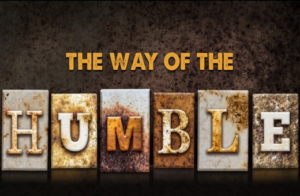 The humble man is a true man, the humble woman is a true woman. May we have such men and women to govern the world – all countries, regions, cities and towns! For these men and women would be true lights for the entire world, capable of sometimes acting in ways that are heroic and impartial, capable of doing “good works” for the benefit of all humanity. True and remarkable personalities, men and women who can serve as role models for their fellow citizens – this is what today’s world needs so much!
The humble man is a true man, the humble woman is a true woman. May we have such men and women to govern the world – all countries, regions, cities and towns! For these men and women would be true lights for the entire world, capable of sometimes acting in ways that are heroic and impartial, capable of doing “good works” for the benefit of all humanity. True and remarkable personalities, men and women who can serve as role models for their fellow citizens – this is what today’s world needs so much!
In all of human history, we have never known and we shall never know a truer woman than Mary, the Mother of Jesus. Her humility was peerless and it will ever remain unequaled and unequalable. It gained for her the reception of the greatest dignity there is: that of the Mother of God! Truly, it is indeed in Mary that the following word of the Lord is perfectly realized: “He who humbles himself will be exalted.” Truly, Mary was this strong woman, this true woman, this creature similar to God, perfectly fulfilling her humanity, not only at the foot of the Cross of Calvary, but above all in the Cenacle, with the Apostles, on the Day of Pentecost!
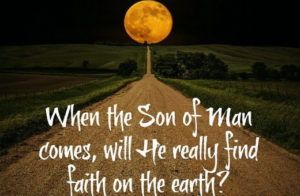 Jesus says that we “ought always to pray and not lose heart.” This is not a command we are obliged to obey: it is advice. When we have nothing to do, let us pray! There are many times throughout the day when we are unoccupied: if we drive a car, there are many times when we must stop – which would ordinarily threaten our patience – and these are favourable times to pray; if we travel by bus or subway, then too we have free time in which to pray! He who is clever can always find time for anything he wants to do: so then why not dedicate this cleverness to finding time for prayer? It is not necessary to say long prayers: indeed, many very short prayers are worth a long one!
Jesus says that we “ought always to pray and not lose heart.” This is not a command we are obliged to obey: it is advice. When we have nothing to do, let us pray! There are many times throughout the day when we are unoccupied: if we drive a car, there are many times when we must stop – which would ordinarily threaten our patience – and these are favourable times to pray; if we travel by bus or subway, then too we have free time in which to pray! He who is clever can always find time for anything he wants to do: so then why not dedicate this cleverness to finding time for prayer? It is not necessary to say long prayers: indeed, many very short prayers are worth a long one!
So Jesus tells us a parable intended to encourage all those who believe in him to persevere in prayer until they are heard. This is not the first time that the Lord tells a parable of this kind. Let us remember the one about the man who knocks on his friend’s door, in the middle of the night, in order to ask him for a few loaves of bread to feed some unforeseen visitors. The Lord concludes that parable by saying: “I tell you, though he will not get up and give him anything because he is his friend, yet because of his importunity he will rise and give him whatever he needs.” .
The contrast here stands out, and this is what should motivate the children of God to pray to their Father who is in Heaven! For, if a judge who is unrighteous, that is, one who dispenses justice with partiality, eventually pronounces a judgement in favor of this widow, then it is absolutely necessary for us to believe, without any hesitation, that God, the Father of us all, will hear our prayer and will acknowledge us with justice as his adopted children! I say it a thousand times: let us not be afraid! Let us place in God all of our CONFIDENCE! Even if God does not hear our prayer today or tomorrow, let us believe that he is the only Almighty One and that he will never abandon us if we persevere in believing and hoping in him!
God is GOOD! He is Love! He is already here with us! However, we do not see him… We must believe he is here! We must always believe! We must persevere in faith, until the end, until the end of our life! That is all we must do… We must pray to always believe, and believe to always pray! Until the end… Without ever wearying… Day after day, week after week, year after year. For, in the end, it is the Glory of Paradise that awaits us, the fruit of our long and patient perseverance in faith!
 On the eve of his Passion, Jesus said to Simon Peter: “I have prayed for you that your faith may not fail.” This, to some extent, is an answer to the question asked by the Lord: “When the Son of man comes, will he find faith on earth?” For Peter and the Church are one: the same unique Mystery, that of the Mystical Body of Christ. Yes, Jesus will find faith on earth when he returns, for he PRAYED for Simon Peter, and thus also for the entire Church! But, the key to the problem is always the same: PRAYER!
On the eve of his Passion, Jesus said to Simon Peter: “I have prayed for you that your faith may not fail.” This, to some extent, is an answer to the question asked by the Lord: “When the Son of man comes, will he find faith on earth?” For Peter and the Church are one: the same unique Mystery, that of the Mystical Body of Christ. Yes, Jesus will find faith on earth when he returns, for he PRAYED for Simon Peter, and thus also for the entire Church! But, the key to the problem is always the same: PRAYER!
Let us place all our confidence in God, and without any doubt, sooner or later, he will hear us. Let us ask the Most Holy Virgin Mary to help us, not only to pray, but also to believe in her Son Jesus, the Redeemer and Savior of all men! With God, Mary is here, in the Church and in the world: with her Spouse, the Holy Spirit, Mary watches over each one of the children of God, who are also her children in Jesus Christ! In this spirit of abandonment and confidence, let us receive within us Jesus-Eucharist, and let us form but a single Body of Christ, in a single faith, a single hope, a single charity!
 God created man in his image and likeness . The Lord gave man a body and a soul, in order that, through these two elements, of which he is composed, man might truly be the creature closest to God, and, at the same time, the summary of all creation. For, in the universe the Lord created in his Love, there are, at one extreme, material beings which are always composite and multiple; and at the other extreme, spiritual beings – the angels – which are always simple and unique. Thus, in man, God joined together that which is multiple – in his body – and that which is unique – in his soul. And thus, the Lord created in man a being that resembles him, since, in his infinite Love, God is multiple divine Persons, eternally united to each other.
God created man in his image and likeness . The Lord gave man a body and a soul, in order that, through these two elements, of which he is composed, man might truly be the creature closest to God, and, at the same time, the summary of all creation. For, in the universe the Lord created in his Love, there are, at one extreme, material beings which are always composite and multiple; and at the other extreme, spiritual beings – the angels – which are always simple and unique. Thus, in man, God joined together that which is multiple – in his body – and that which is unique – in his soul. And thus, the Lord created in man a being that resembles him, since, in his infinite Love, God is multiple divine Persons, eternally united to each other.
So how could the Loving Creator allow men and women to be prey to everything that seeks to destroy their bodies and their souls? God wants to save all men, and all of the man. The Son of God came into the world and was made man in order that, through the redeeming Sacrifice of the Cross, eternal Life, the very Life of God, might one day belong to the entire man, body and soul. So, when these ten lepers go to meet Christ, the Lord Jesus cannot fail to think of his Mission: that of healing bodies, but also, and especially, souls! While Jesus wants to heal these ten men of the leprosy that oppresses and disfigures them, he intends, first, to touch the soul of each one of them individually, in order that the image of God might be fully restored there.
Jesus saw them… He saw the ugliness of their bodies, and especially that of their faces… They had lost that beauty which is a reflection of the splendor of the Creator… But Jesus also saw the soul of each one of them. For some, their soul was even uglier than their body… For others, Jesus saw that in their soul there was still that vestige of the first creation, a vestige upon which the Blood of his supreme Sacrifice would soon be poured for the final Resurrection! Already, looking at them, Jesus saw all the elect of God, on humanity’s last Day, gathered together in order to go up with him to his Father, in an eternal encounter with God! So, having taken a good look at them, Jesus did not hesitate to give them an order, he who is the Master of all Creation: “Go and show yourselves to the priests.”
All ten of the lepers obeyed the order of the Lord: they went and showed themselves to the priests. In fact, all lepers, once they were healed, had to show themselves to the priests in order for their healing to be officially acknowledged and thus for them to regain the right to live among others. But, surprisingly, when the ten lepers set out to go and show themselves to the priests, they were not yet healed, or at least not yet in their bodies… It was only after they had begun their journey that they found themselves to have been healed of leprosy! In fact, they had already been healed in their souls, and it is this spiritual healing, the most important in the eyes of God, which allowed them to set out on their journey, on the road that would be the setting of their corporeal healing…
So the ten lepers are healed! But, astonishingly, only one of the ten thought of retracing his steps in order to thank the Lord for having healed him… Perhaps the nine others thanked God in their hearts? In any case, they were all healed. This is clearly what follows from the words of the Lord: “Were not ten cleansed? Where are the nine?” One may assume that all ten received from God the grace necessary to go to Jesus and thank him for having healed them. But, unfortunately, only one man faithfully responded to the Lord’s call…
 This is a lesson for all of us, a lesson of vigilance and gratitude towards divine Providence. The path of spiritual life, represented by the road taken by the ten lepers, is a difficult path, one that is sometimes filled with obstacles. Only he who is vigilant follows the right way, which is Christ . Moreover, this Way is the only one that saves: “And he said to him, «Rise and go your way; your faith has made you well.» ” On the Way of Salvation, everything matters: it is our entire person, both body and soul, that must give thanks to God. We should not follow Jesus from afar: we must be very close to him, in our faith, our hope, our charity, but also in our body, just like Mary, a strong woman who stood at the foot of the Cross! The Savior of men is not a being who is absent and distant from us: he is here, nearby, so close that he comes into us at each Eucharist!
This is a lesson for all of us, a lesson of vigilance and gratitude towards divine Providence. The path of spiritual life, represented by the road taken by the ten lepers, is a difficult path, one that is sometimes filled with obstacles. Only he who is vigilant follows the right way, which is Christ . Moreover, this Way is the only one that saves: “And he said to him, «Rise and go your way; your faith has made you well.» ” On the Way of Salvation, everything matters: it is our entire person, both body and soul, that must give thanks to God. We should not follow Jesus from afar: we must be very close to him, in our faith, our hope, our charity, but also in our body, just like Mary, a strong woman who stood at the foot of the Cross! The Savior of men is not a being who is absent and distant from us: he is here, nearby, so close that he comes into us at each Eucharist!
 Today we have a rather short Gospel. But this text has the advantage of providing us with a complete lesson on faith and on our relation with God. For, what is faith if not the supernatural virtue through which eternal life is already begun in us ? Indeed, through faith, we already share in the very life of God: we live in communion with God.
Today we have a rather short Gospel. But this text has the advantage of providing us with a complete lesson on faith and on our relation with God. For, what is faith if not the supernatural virtue through which eternal life is already begun in us ? Indeed, through faith, we already share in the very life of God: we live in communion with God.
However, we do not see God. As long as we are on this earth, and not yet at home with our Father, God remains invisible to the eyes of our body. We believe in God, whom we do not see, in God who, however, has revealed himself to us in Jesus, his Son, “the Image of the invisible God”. But, precisely because God revealed himself in Jesus Christ, faith nonetheless gives us a certain vision of God, a wholly supernatural vision, a vision that is perceived only by the soul, and not by the body…
To believe in God: this is the most marvellous thing we can accomplish on earth! The act of faith is also what most pleases God! For he who truly believes in God – with all his heart, with all his being, with all his strength – truly renounces all that is not God, he renounces even his own person, in order to love only God and to be one with him. This is what pleases God. So there is no doubt that it was the Spirit of God who led the apostles to ask of Jesus: “Increase our faith!”
Of course, the answer of the Lord may seem like a reproach: “If you had faith as a grain of mustard seed, you could say to this sycamine tree, ‘Be rooted up, and be planted in the sea,’ and it would obey you.” But it could just as well be an explanation. Did not Jesus, the Master of all, come to teach? In any case, whether it is a reproach or an explanation, the words of Jesus are words of gold, similar to those recorded elsewhere by Saint Matthew: “If you have faith as a grain of mustard seed, you will say to this mountain, ‘Move from here to there,’ and it will move; and nothing will be impossible to you.”
This short parable, this object lesson, helps to complete Jesus’ teaching on faith. Actually, here we are no longer dealing with faith, but rather with order and obedience. This is true. But these two things are one. When someone believes in God, whom he does not see, in God who reveals himself in his Son Jesus, he bows down and humbles himself before a being – the Being par excellence – who is infinitely wiser and more powerful than he is. He who believes in God does not do what he himself wants, but rather what God wants: he carries out the command of God, he obeys God, who dictates to him his Word in his Son Jesus.
But that is not all. For God does not act as men do. God does not act like the master described in the parable told by Jesus. Among men, he who humbles himself before his master, he who is the servant, will not see his master come and humble himself before him and treat him as an equal: “Will he not rather say to him, ‘Prepare supper for me, and gird yourself and serve me, till I eat and drink; and afterward you shall eat and drink?’ ” But things are not like that with God: when a man obeys God and does his will while believing in him, God also does the will of this man, and, in a way, God obeys the man.
 Indeed, Jesus has just said: “If you had faith as a grain of mustard seed, you could say to this sycamine tree, ‘Be rooted up, and be planted in the sea,’ and it would obey you.” Now, this would be a miracle, an exemption from the laws of nature: if a tree would cast itself into the sea, or if a mountain would suddenly move from one place to another by itself, due solely to the fact that we believed that God could do this, then there is no doubt that this would not be a natural act, but rather an act of God. If we do what God wants, then God does what we want!
Indeed, Jesus has just said: “If you had faith as a grain of mustard seed, you could say to this sycamine tree, ‘Be rooted up, and be planted in the sea,’ and it would obey you.” Now, this would be a miracle, an exemption from the laws of nature: if a tree would cast itself into the sea, or if a mountain would suddenly move from one place to another by itself, due solely to the fact that we believed that God could do this, then there is no doubt that this would not be a natural act, but rather an act of God. If we do what God wants, then God does what we want!
Will we always see God obeying us? No. Only sometimes, and perhaps even seldom… This is not surprising. Faith is faith. As long as we are not in Heaven, we will not see God. Enough often, our lack of vision is due to our lack of faith, or a faith that is not strong enough to see God acting in our midst and doing our will… Moreover, have we merited it? Is faith not a grace, a free gift of God? Then let us be content to believe – as much as we can, as well as we can – and God will do the rest, whether we see it or not: “When you have done all that is commanded you, say, ‘We are unworthy servants; we have only done what was our duty.’ “
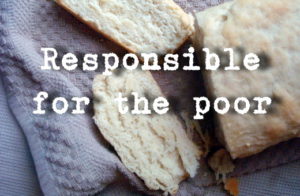 For us Christians, often as deeply infected with these ideas as anyone, there is another distortion as well. Our way of living our faith can be very individualistic and self-centred. The emphasis is on personal salvation (“saving my soul”) and that is achieved by being a morally good person. Morally good means avoiding actions which are ethically wrong, such as, failing to worship God in the “official” way, committing violent actions against others, behaving in a sexually immoral way (we coyly use the word “impure”), stealing things from people, gossiping maliciously about others, being jealous, envious, angry, resentful… and so on. Seldom in confession do people say: “I was not a loving person” but that they broke rules and disappointed themselves. Seldom do people confess the harm that their sins caused in others. I have never heard a person confess to cheating on taxes, although this is one of the chief ways in which people fail to express solidarity for the less well-off in their community.
For us Christians, often as deeply infected with these ideas as anyone, there is another distortion as well. Our way of living our faith can be very individualistic and self-centred. The emphasis is on personal salvation (“saving my soul”) and that is achieved by being a morally good person. Morally good means avoiding actions which are ethically wrong, such as, failing to worship God in the “official” way, committing violent actions against others, behaving in a sexually immoral way (we coyly use the word “impure”), stealing things from people, gossiping maliciously about others, being jealous, envious, angry, resentful… and so on. Seldom in confession do people say: “I was not a loving person” but that they broke rules and disappointed themselves. Seldom do people confess the harm that their sins caused in others. I have never heard a person confess to cheating on taxes, although this is one of the chief ways in which people fail to express solidarity for the less well-off in their community.And perhaps there are thousands of us just like him in the Catholic Church here and all over the world.
How aware am I of these problems? How aware am I that I am somehow responsible for their elimination? What, in practice, am I contributing to the removal of these problems? Being a personally “good Catholic” is hardly enough.
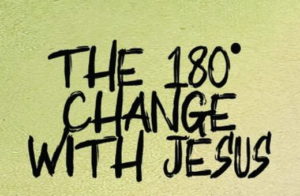 The rich man made no move whatever to share what he had at the table. He could have done so at either of two levels. First, he could have seen to it that the poor man had enough to eat and he might even have gone further and “donated” medical treatment. This is the level of “charity”, the level most of us feel good about doing. But it is not yet the Gospel.
The rich man made no move whatever to share what he had at the table. He could have done so at either of two levels. First, he could have seen to it that the poor man had enough to eat and he might even have gone further and “donated” medical treatment. This is the level of “charity”, the level most of us feel good about doing. But it is not yet the Gospel.In the second level, neither of the men can be regarded as rich or poor. They sit down together at the same table and they give and receive and share on a footing of equal dignity the meal and the food. It is quite irrelevant whether one of them is more intelligent, more active, more enterprising, more healthy. What is important is that each cares deeply for the other and sees that the needs of each are taken care of with the resources available. Strangely enough, the poor are usually much better at that than the rich. Which makes one wonder, who in the world are the really rich, enriched and enriching?
 Jesus teaches his disciples: he pursues his catechesis through the use of a new parable, one which he will use to direct their minds to the realities of Heaven; and this he will accomplish by starting with the terrestrial realities to which we are most attached: money and profit of all kinds. “There was a rich man who had a steward… He said to him, Turn in the account of your stewardship…” At the end of our life, the Lord will also say to each one of us: “Turn in the account of your stewardship! I filled you with grace and talents of all kinds, what did you do with them? It is time!” Or rather, the Lord will say, “There is no more time! Henceforth you will no longe…”
Jesus teaches his disciples: he pursues his catechesis through the use of a new parable, one which he will use to direct their minds to the realities of Heaven; and this he will accomplish by starting with the terrestrial realities to which we are most attached: money and profit of all kinds. “There was a rich man who had a steward… He said to him, Turn in the account of your stewardship…” At the end of our life, the Lord will also say to each one of us: “Turn in the account of your stewardship! I filled you with grace and talents of all kinds, what did you do with them? It is time!” Or rather, the Lord will say, “There is no more time! Henceforth you will no longe…”
We can clearly see that this parable is addressed to us, we who are still living! For the sentence of the rich man, he for whom the dishonest steward works, doesn’t apply immediately: the steward still has time to make arrangements in order to protect himself from what he can see is the inevitable result of that sentence, namely the loss of his employment. “I have decided what to do, so that people may receive me into their houses when I am put out of the stewardship.” The sentence of the master of the house has not yet come into effect, but the steward can foresee that it will, and he can foresee it in time! This is what is important! If we, too, have foresight, then we will be able to appear with complete confidence before the eternal Judge when he will say to us: “Turn
in the account of your stewardship!”
What does ‘unrighteous mammon’ mean? The answer is not to be searched for outside the context of this parable. So how does the unfaithful steward dishonestly earn money? Simply by forgiving a part of the debt owed by his master’s debtors. Therefore, this is what we must do as well, but not in the same way. We must not act as sons of this world, but rather as sons of light! This means that we have to forgive the debts of those who owe us something due to the offenses they commit against us. In short, we have to do what the Lord himself taught us to do in his prayer: “Our Father… Forgive us our debts, as we also have forgiven our debtors.”
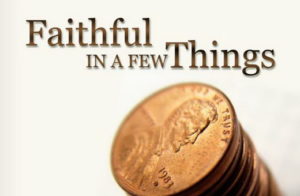 We have to forgive everyone who has offended us! For, in this way, we will make friends: “Make friends for yourselves by means of unrighteous mammon…” Forgiveness produces the unity of all the believers in Christ and, through this unity, the unity of all men and women on earth! There is still time! It is not too late to forgive the person who offended us! At this moment, it is still not too late, but the day will come, perhaps very soon, when there will be no more forgiveness possible… Then it will be too late; it will be the moment of eternity, when it will be necessary that we turn in the account of our stewardship! On that day, we will no longer be able to find unrighteous mammon: we will be without it, for there will be no more forgiveness! “Make friends for yourselves by means of unrighteous mammon, so that when it fails they may receive you into the eternal habitations.”
We have to forgive everyone who has offended us! For, in this way, we will make friends: “Make friends for yourselves by means of unrighteous mammon…” Forgiveness produces the unity of all the believers in Christ and, through this unity, the unity of all men and women on earth! There is still time! It is not too late to forgive the person who offended us! At this moment, it is still not too late, but the day will come, perhaps very soon, when there will be no more forgiveness possible… Then it will be too late; it will be the moment of eternity, when it will be necessary that we turn in the account of our stewardship! On that day, we will no longer be able to find unrighteous mammon: we will be without it, for there will be no more forgiveness! “Make friends for yourselves by means of unrighteous mammon, so that when it fails they may receive you into the eternal habitations.”
In the course of today’s Eucharistic celebration, we are going to receive within ourselves He who was made the servant of all: Jesus! Let us serve him as well! Let us be ‘other Christs’ and follow his example! Let us forgive our enemies, as Jesus forgave his enemies! Let us forgive the debts of our debtors: let us not be attached to money! Let us serve only God, and not money! May Mary help us to find the way of salvation, which is to follow her divine Son!
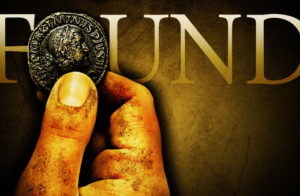 “When the time had fully come, God sent forth his Son, born of woman…” With these few words, Saint Paul summarizes God’s Work for the men and women he created in his Love: God sent his Son… This sending, this mission had been prepared a long time beforehand, ever since Adam and Eve, unfortunately, sinned against the Lord. During the time of preparation, God already sent his grace, a grace that was not yet that of Jesus the Savior, but a grace that made it possible for men to faithfully await the promised Messiah. Finally there came the fullness of time, the hour when the preparation was complete and when the Messiah was finally to be sent to save all the men and women of the earth.
“When the time had fully come, God sent forth his Son, born of woman…” With these few words, Saint Paul summarizes God’s Work for the men and women he created in his Love: God sent his Son… This sending, this mission had been prepared a long time beforehand, ever since Adam and Eve, unfortunately, sinned against the Lord. During the time of preparation, God already sent his grace, a grace that was not yet that of Jesus the Savior, but a grace that made it possible for men to faithfully await the promised Messiah. Finally there came the fullness of time, the hour when the preparation was complete and when the Messiah was finally to be sent to save all the men and women of the earth.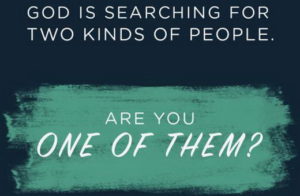 God is truly good, He is infinitely merciful! The Lord unceasingly waits for the sinner with compassion, lavishing upon him his all-powerful grace in order to help him on the way to conversion. He even sends him an angel to watch over him: his guardian angel! The mission of this angel, of this spiritual being, is to safeguard and to facilitate the transmission of the grace of God to the man or woman the angel has in his care. It is thus completely natural that the angels would express joy when a sinner converts himself by accepting the grace of God and rejecting all attachment to sin: “There is joy before the angels of God over one sinner who repents.”
God is truly good, He is infinitely merciful! The Lord unceasingly waits for the sinner with compassion, lavishing upon him his all-powerful grace in order to help him on the way to conversion. He even sends him an angel to watch over him: his guardian angel! The mission of this angel, of this spiritual being, is to safeguard and to facilitate the transmission of the grace of God to the man or woman the angel has in his care. It is thus completely natural that the angels would express joy when a sinner converts himself by accepting the grace of God and rejecting all attachment to sin: “There is joy before the angels of God over one sinner who repents.” Jesus is on the road, going from village to village to proclaim the coming of the Kingdom of God. For the Kingdom of God had come: Jesus, the Son of God, is here! The fullness of time is accomplished: God has sent his Son, born of a woman ! Wonder of wonders! Everyone who had been able to get close to the Lord had witnessed many miracles, and healings without number: truly, all are amazed! One might think one were already in the time of the Resurrection of bodies, that time when there is no more time, for it will be the end of time, that ultimate moment where the Glory of God will appear in all its splendor!
Jesus is on the road, going from village to village to proclaim the coming of the Kingdom of God. For the Kingdom of God had come: Jesus, the Son of God, is here! The fullness of time is accomplished: God has sent his Son, born of a woman ! Wonder of wonders! Everyone who had been able to get close to the Lord had witnessed many miracles, and healings without number: truly, all are amazed! One might think one were already in the time of the Resurrection of bodies, that time when there is no more time, for it will be the end of time, that ultimate moment where the Glory of God will appear in all its splendor!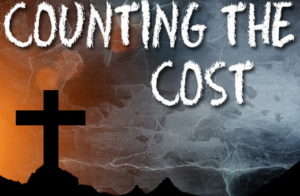 This is what Jesus wants to make us understand through the examples or parables he tells us today. Both the man who wants to build a tower and the man who wants to go to war must act with prudence, a prudence that must lead them to reflect and to envisage what might happen to them if they follow the route they are considering. He who wants to build a tower must foresee the need for sufficient money to complete his construction, and he who wants to go to war must foresee the need for enough men to defeat his enemy. The same must be true for the Christian who wants to go to Heaven and be with Christ, and who wants, by this very fact, to avoid hell: to do this, the Christian must prepare himself and be ready, in a boundless love of God, in holy hope, in firm faith, for the only thing he can foresee is precisely that the Lord will come for him at the very moment that was unforeseen…
This is what Jesus wants to make us understand through the examples or parables he tells us today. Both the man who wants to build a tower and the man who wants to go to war must act with prudence, a prudence that must lead them to reflect and to envisage what might happen to them if they follow the route they are considering. He who wants to build a tower must foresee the need for sufficient money to complete his construction, and he who wants to go to war must foresee the need for enough men to defeat his enemy. The same must be true for the Christian who wants to go to Heaven and be with Christ, and who wants, by this very fact, to avoid hell: to do this, the Christian must prepare himself and be ready, in a boundless love of God, in holy hope, in firm faith, for the only thing he can foresee is precisely that the Lord will come for him at the very moment that was unforeseen…Let us try not to desire anything immoderately. Let us try not to get attached to earthly goods. For the Lord is the sole desirable Good, the only one we should desire wholeheartedly. It is by truly desiring him, and him alone, that we will be his disciples. This is what we shall do, with the help of his grace, during today’s Eucharist.
 Jesus passes through a village; and after he had taught the people there, a man asks him: “Lord, will those who are saved be few?” Jesus had probably mentioned in his teaching the fact that those who had acted in a good manner during their life would be saved, while others, who had acted in a bad manner, would be condemned. After this man had thought a little about what Jesus had just said, he began to wonder if many would be damned and few would be saved, owing to the fact that, when one thinks about it, one realizes that few people act in a truly good manner during their life on earth, and, alas, many people do evil and offend God, without ever asking him to forgive them all their misdeeds…
Jesus passes through a village; and after he had taught the people there, a man asks him: “Lord, will those who are saved be few?” Jesus had probably mentioned in his teaching the fact that those who had acted in a good manner during their life would be saved, while others, who had acted in a bad manner, would be condemned. After this man had thought a little about what Jesus had just said, he began to wonder if many would be damned and few would be saved, owing to the fact that, when one thinks about it, one realizes that few people act in a truly good manner during their life on earth, and, alas, many people do evil and offend God, without ever asking him to forgive them all their misdeeds… The next part of the discourse of Jesus deals, first of all, with the rejection of the Jewish People, which, for the most part, did not convert to Christianity. This rejection made it possible for the pagan Nations to enter the Church and thus to take for themselves the place that had been left vacant by those who were the first to be called: “And behold, some are last who will be first, and some are first who will be last.” But what is most important in Jesus’ discourse is the firmness and irrevocability of the following saying of the Lord: “When once the householder has risen up and shut the door, you will begin to stand outside and to knock at the door, saying, ‘Lord, open to us.’ He will answer you, ‘I do not know where you come from.’ ” For the gate is definitively closed…
The next part of the discourse of Jesus deals, first of all, with the rejection of the Jewish People, which, for the most part, did not convert to Christianity. This rejection made it possible for the pagan Nations to enter the Church and thus to take for themselves the place that had been left vacant by those who were the first to be called: “And behold, some are last who will be first, and some are first who will be last.” But what is most important in Jesus’ discourse is the firmness and irrevocability of the following saying of the Lord: “When once the householder has risen up and shut the door, you will begin to stand outside and to knock at the door, saying, ‘Lord, open to us.’ He will answer you, ‘I do not know where you come from.’ ” For the gate is definitively closed…Let us retain the following truths, which will aid us on the road of salvation: – baptism is a very great sacrament, but in order to be saved, baptism is not sufficient; – he who prays will certainly be saved, for, through this prayer, God will give him his grace; – as the life is, so is the death: he who lives well dies well, in the love of God.
 John the Baptist, announcing to the Jewish People the coming of the Savior, said: “I baptize you with water; but he who is mightier than I is coming, the thong of whose sandals I am not worthy to untie; he will baptize you with the Holy Spirit and with fire. His winnowing fork is in his hand, to clear his threshing floor, and to gather the wheat into his granary, but the chaff he will burn with unquenchable fire.”
John the Baptist, announcing to the Jewish People the coming of the Savior, said: “I baptize you with water; but he who is mightier than I is coming, the thong of whose sandals I am not worthy to untie; he will baptize you with the Holy Spirit and with fire. His winnowing fork is in his hand, to clear his threshing floor, and to gather the wheat into his granary, but the chaff he will burn with unquenchable fire.”
 The murder of Abel by Cain demonstrates that humanity’s very first family dissension originated in jealousy, but it was jealousy of a spiritual order, the most terrible jealousy there is! Indeed, Cain was vexed by the fact that God had regard for Abel’s offering but did not have regard for his. Now, Abel’s offering was already a sign of faith in the promise of the Messiah who was to come! Thus, Christ was truly the cause of the first family dissension…
The murder of Abel by Cain demonstrates that humanity’s very first family dissension originated in jealousy, but it was jealousy of a spiritual order, the most terrible jealousy there is! Indeed, Cain was vexed by the fact that God had regard for Abel’s offering but did not have regard for his. Now, Abel’s offering was already a sign of faith in the promise of the Messiah who was to come! Thus, Christ was truly the cause of the first family dissension…But this is not something we are doomed to undergo! If Jesus reminded to us that dissensions would take place because of him, it is precisely in order that we might take care to avoid them! Dissensions there were, and dissensions there will be. But we should do all we can to prevent them, and, if they have already occurred, we should do what we can to quell them, as much as possible…
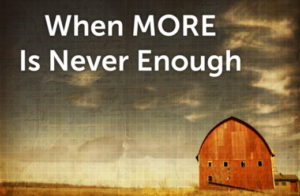 Jesus was teaching the crowd when someone interrupted him, saying, “Teacher, bid my brother divide the inheritance with me.” Here, Jesus was presented with a family dispute, in order that he might resolve it. But Jesus does not want to be bothered with this dispute. Why not? Precisely because it is a family dispute. Now, who is a member of the family of Jesus? Jesus had already told us: “My mother and my brothers are those who hear the word of God and do it.” The family of Jesus is made up of all those whom the Father adopted as sons and daughters, for these people listen to the Word, which is his Son. Jesus has but a single concern throughout his life: his own family, his brothers, his sisters, all those for whom Mary, his own Mother, became their Mother in the Holy Spirit!
Jesus was teaching the crowd when someone interrupted him, saying, “Teacher, bid my brother divide the inheritance with me.” Here, Jesus was presented with a family dispute, in order that he might resolve it. But Jesus does not want to be bothered with this dispute. Why not? Precisely because it is a family dispute. Now, who is a member of the family of Jesus? Jesus had already told us: “My mother and my brothers are those who hear the word of God and do it.” The family of Jesus is made up of all those whom the Father adopted as sons and daughters, for these people listen to the Word, which is his Son. Jesus has but a single concern throughout his life: his own family, his brothers, his sisters, all those for whom Mary, his own Mother, became their Mother in the Holy Spirit!
Jesus provides all those who are present with a lesson: a parable. Jesus wants to make everyone understand what one must not do: “So is he who lays up treasure for himself, and is not rich toward God.” But what is it to be “rich toward God”? Quite simply, it is to be “poor in spirit”! “Blessed are the poor in spirit, for theirs is the kingdom of heaven” (Mt. 5:3) A Christian is not a man who lives outside of time: he possesses things, he buys, he sells, he works to earn his wages, whether these wages be high or low. But the Christian must, first of all, be a man or woman who is poor in his or her heart: all that he has, he entrusts it to God, and God takes care of him, more than he could ever do so himself! The Christian watches over his home or property, he installs locks on the doors, and makes use of alarms and theft protection devices; but, in fact, it is the Lord who protects his house and all his goods!
Jesus is our brother, and Mary is our Mother! If we have a disagreement with our earthly brothers and sisters, let us entrust it all to Jesus and to Mary! Didn’t they live on earth too? Didn’t they see among their contemporaries all of the problems known to the families of the world? Let us rely on Jesus and Mary! Let us ask them to lift up our spirit to Heaven, where the family of God lives in perfect harmony, forever and ever!
 In the prologue of his Gospel on the Word of Life, Saint John tells us: “From his fulness have we all received, grace upon grace. For the law was given through Moses; grace and truth came through Jesus Christ.” This is also what Saint Luke tells us today when he reports the visit of Jesus to a village, this village being none other than Bethany, where Lazarus and his two sisters, Martha and Mary, live. For, when Jesus visits someone, it is to give that person a gift, the most beautiful one there is: the gift of his grace, the source of eternal life!
In the prologue of his Gospel on the Word of Life, Saint John tells us: “From his fulness have we all received, grace upon grace. For the law was given through Moses; grace and truth came through Jesus Christ.” This is also what Saint Luke tells us today when he reports the visit of Jesus to a village, this village being none other than Bethany, where Lazarus and his two sisters, Martha and Mary, live. For, when Jesus visits someone, it is to give that person a gift, the most beautiful one there is: the gift of his grace, the source of eternal life! In today’s first reading, we heard the story of Abraham, who was visited at his home by three men, images and figures of the Most Holy Trinity coming to dwell in the hearts of the just. Now, something important happened which was the fruit of this visit: the announcement of the birth of a son, a year at most after this meeting between Abraham and the three men . This means that he or she who receives a visit from God, and who believes in him, will also receive the promise that he or she will give birth to a child, this being understood in a spiritual sense. In other words, all those who receive the gift of God’s grace can hope, one day, to truly become the sons and daughters of God! The grace of God is never received in vain: it is like a spring from which pours forth water for eternal life!
In today’s first reading, we heard the story of Abraham, who was visited at his home by three men, images and figures of the Most Holy Trinity coming to dwell in the hearts of the just. Now, something important happened which was the fruit of this visit: the announcement of the birth of a son, a year at most after this meeting between Abraham and the three men . This means that he or she who receives a visit from God, and who believes in him, will also receive the promise that he or she will give birth to a child, this being understood in a spiritual sense. In other words, all those who receive the gift of God’s grace can hope, one day, to truly become the sons and daughters of God! The grace of God is never received in vain: it is like a spring from which pours forth water for eternal life!Truly, “Mary has chosen the good portion, which shall not be taken away from her.” How can we not see, here, that other Mary, the unique, she whom God chose to be his Mother according to the flesh! Even more so than Martha’s sister, Mary the Mother of Jesus is our model in the service of the Word of God! But as Mary is the model of all of Christ’s faithful, she is also the model of all those who serve God by faithfully, but spiritually, taking care of their home. Did Mary not leave Nazareth right after the Incarnation in her of the Word, in order to go and help her cousin Elizabeth with her housework? But it is in the intimacy of the Word of God, in the union with the Holy Spirit who has become her Husband, that Mary resolutely put herself in the service of the Lord and of his Mystical Body, already born!
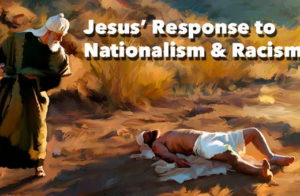 Jesus, during his life on earth, just like his disciples of today and yesterday, was subjected to trial and interrogation concerning his teaching. For Jesus always appeared in the eyes of his contemporaries to be a Teacher, and even the Teacher par excellence. Even in the most complete ignominy, Christ appeared to be he who knows all, for he is God: “Truly this was a son of God,” exclaimed the centurion present at the foot of the Cross of Jesus . Today as yesterday, ever since the day of Pentecost, the Church is also regarded as she who possesses the Truth, which is Christ himself. Thus, it is also to the Church that this question is posed: “What shall I do to inherit eternal life?”
Jesus, during his life on earth, just like his disciples of today and yesterday, was subjected to trial and interrogation concerning his teaching. For Jesus always appeared in the eyes of his contemporaries to be a Teacher, and even the Teacher par excellence. Even in the most complete ignominy, Christ appeared to be he who knows all, for he is God: “Truly this was a son of God,” exclaimed the centurion present at the foot of the Cross of Jesus . Today as yesterday, ever since the day of Pentecost, the Church is also regarded as she who possesses the Truth, which is Christ himself. Thus, it is also to the Church that this question is posed: “What shall I do to inherit eternal life?” Indeed, it is clear that Jesus highly praises the charity of the Good Samaritan: certainly, it is an act which saves this Samaritan from damnation, just as it saves the wounded man from an undoubtedly cruel death. Jesus says so to the lawyer, after telling the story of the parable: “Go and do likewise.” But what, in fact, was the act of the Good Samaritan? Did he obey the Law, with which he was in contradiction, given that he was a “Samaritan”? Did he hear the preaching of Jesus, who is one of the Jews with whom the Samaritan would avoid having any relations? No, neither of these is the case. In fact, the Good Samaritan listened to his conscience! He acted righteously, he followed his good conscience, and it is this that established him on the path of eternal Life! The proof of this is that he said to the landlord: “Take care of him; and whatever more you spend, I will repay you when I come back.”
Indeed, it is clear that Jesus highly praises the charity of the Good Samaritan: certainly, it is an act which saves this Samaritan from damnation, just as it saves the wounded man from an undoubtedly cruel death. Jesus says so to the lawyer, after telling the story of the parable: “Go and do likewise.” But what, in fact, was the act of the Good Samaritan? Did he obey the Law, with which he was in contradiction, given that he was a “Samaritan”? Did he hear the preaching of Jesus, who is one of the Jews with whom the Samaritan would avoid having any relations? No, neither of these is the case. In fact, the Good Samaritan listened to his conscience! He acted righteously, he followed his good conscience, and it is this that established him on the path of eternal Life! The proof of this is that he said to the landlord: “Take care of him; and whatever more you spend, I will repay you when I come back.”“Many are called, but few are chosen.” This remains true, even after reading the parable of the Good Samaritan. For, there were three people who came upon the wounded man. However, only one of the three helped him… Let us reflect on this question: “What shall I do to inherit eternal life?” Let us ask the Holy Spirit to guide us each day of our life! Above all, let us pray to the Most Blessed Virgin Mary! She is the Mother of God, the Mediatrix of all graces! And yet, by her unequalled virtue, She is truly the least of the little ones!
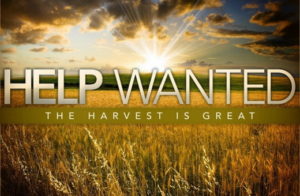 Jesus is the messenger of the Father: he is the beloved Son, the one in whom the Father put all his love! Jesus is he who comes to bring to the world all of God’s love for men! For love wants to propagate itself always further and further: all love – and God is love – is in God from all eternity, but he can and always wants to pour himself out into the creatures whom he calls to participation in his own life! And therefore Jesus, who is God, has no other desire than that of seeing the love of God spread out more and more across the earth, like a devouring fire: «I came to cast fire upon the earth; and would that it were already kindled!»
Jesus is the messenger of the Father: he is the beloved Son, the one in whom the Father put all his love! Jesus is he who comes to bring to the world all of God’s love for men! For love wants to propagate itself always further and further: all love – and God is love – is in God from all eternity, but he can and always wants to pour himself out into the creatures whom he calls to participation in his own life! And therefore Jesus, who is God, has no other desire than that of seeing the love of God spread out more and more across the earth, like a devouring fire: «I came to cast fire upon the earth; and would that it were already kindled!» Saint Paul said it, with these famous words: «If I have prophetic powers, and understand all mysteries and all knowledge, and if I have all faith, so as to remove mountains, but have not love, I am nothing.» Yes! Even though evil spirits would submit to the disciples of Christ, if these disciples don’t have the love of God in them, it would serve no purpose. There is therefore only one thing that is worthwhile and for which one must rejoice: «that your names are written in heaven,» said Jesus. That is to say, we should rejoice for the gifts which the Lord has given us only insofar as we are assured, by God’s grace, that the Lord is waiting us in heaven.
Saint Paul said it, with these famous words: «If I have prophetic powers, and understand all mysteries and all knowledge, and if I have all faith, so as to remove mountains, but have not love, I am nothing.» Yes! Even though evil spirits would submit to the disciples of Christ, if these disciples don’t have the love of God in them, it would serve no purpose. There is therefore only one thing that is worthwhile and for which one must rejoice: «that your names are written in heaven,» said Jesus. That is to say, we should rejoice for the gifts which the Lord has given us only insofar as we are assured, by God’s grace, that the Lord is waiting us in heaven.How can we receive this assurance from God that our names are written in heaven? Let us read from the book of Revelation: «To him who conquers I will give some of the hidden manna, and I will give him a white stone, with a new name written on the stone which no one knows except him who receives it.» The message is clear: it is the Eucharist, the hidden manna, that gives us this assurance that God has written our name in heaven! So let us receive this sacrament with a great love and with a sincere faith: it is the Lord Jesus who comes into us to fortify us in his own love! May the Most Holy Virgin Mary help us to accomplish so great an act!
